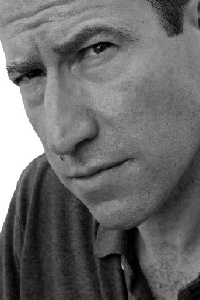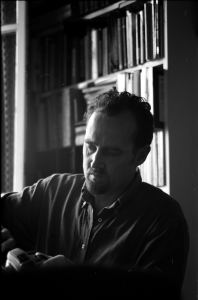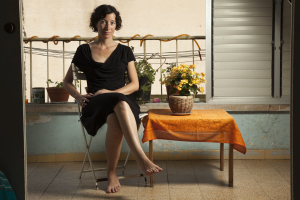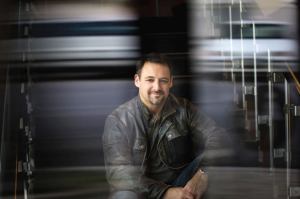Interview with Tim Adler (author of Slow Bleed)
 Author of Slow Bleed, Tim Adler is our new guest at ThrillerBooksJournal.com.
Author of Slow Bleed, Tim Adler is our new guest at ThrillerBooksJournal.com.
Q. Hi Tim, welcome to Thrillerbooksjournal.com. Our first question is very easy: who is Tim Adler as a person and as a writer?
A. I am a journalist and author who has written three non-fiction books to date. My most recent non-fiction book is THE HOUSE OF REDGRAVE, a family biography of the acting dynasty, which The Sunday Times called “compulsively readable” while The Daily Telegraph gave it 5 stars. My previous book, Hollywood and the Mob, was Book of the Week in The Mail On Sunday and Critic’s Choice in the Daily Mail. I have also written for the Financial Times, The Times and, most recently, the Evening Standard. However I have long wanted to write a thriller because it’s my favourite fiction genre.
Q. You’ve already published three non-fiction books before your debut novel, Slow Bleed. Becoming a writer as always been a goal for you, or have you realized you wanted to write in a particular moment in your life?
A. I’m guessing that like most writers I got the bug early on. I had an English teacher who encouraged me to read out a serial novel I was writing aged nine to the rest of the class — my poor classmates having to put up with this. But I suppose things really kicked off when I was 18 and went on holiday abroad for the first time; I read a biography of Samuel Beckett and thought, this is what I want to do with the rest of my life. A couple of years later and I had my first short stories published alongside those of another young writer called Will Self. Of course, Will Self has gone on to be a tremendous success while my career has nosedived (laughs). At that point I thought I had better see if I could make some money out of writing, so I went to journalism school. I came out of journalism school at the height of the recession, and I found it almost impossible to get a job. My worst moment was being interviewed for the role of editorial assistant on Dogs Today magazine. “How do you feel about judging doggy dieting competitions?” I remember the editor asking. “Love ‘em,” I said, nodding vigorously. I still didn’t get the job.
Q. How much has been different writing a novel?
A. Writing a novel is completely different to non-fiction. Writing a biography is really a job of research and, despite writing two non-fiction books previously, it took Anthony Summers and Robbyn Swann, the Pulitzer Prize-nominated investigative journalists, who sat me down and taught me how to do a proper job of research, to really din into me how to write credible non-fiction. Writing fiction is much harder. For a start, finding a simple and original premise, that “what if?” which gets the story going, is as rare as hen’s teeth. What if Hitler had won the war and a Berlin policeman stumbles across evidence of the Holocaust? (FATHERLAND) What if one of the victims of a time-travelling serial killer survives the attack and goes after him? (SHINING GIRLS) What if a wife fakes her disappearance to implicate her husband in her murder? (GONE GIRL) All of these books have simple original hooks, which Hollywood would call “high concept.”
Q. Where did you get the idea for Slow bleed?
A. The pitch for SLOW BLEED is that a woman surgeon hunts down a patient she is convinced has kidnapped her son — the trouble is that everybody else believes the patient is dead. I used to be a film journalist, writing about the business for the trade press, and it came out of my love of woman-in-peril movies — those kind of films starring Ashley Judd or Jodie Foster — where a lone woman goes after somebody to right a wrong or clear her name. It was as simple as that.
Q. Can you briefly summarize the novel (without telling us too much, of course)?
A. As I said, SLOW BLEED is about a woman surgeon who’s on the trail of a patient she believes has kidnapped her son. At the same time, the surgeon is being hunted down by police who want to arrest her for the murder of her ex-husband. It’s a simple chase thriller like THE FUGITIVE. My pitch to publishers was “It’s FLIGHTPLAN set in a hospital” (a 2005 thriller starring Jodie Foster about a woman whose daughter disappears on an airplane).
Q. Why readers might like it? Is there anything they might find difficult to accept in the book?
A. My honest assessment is that some of the writing is really good; it’s the plot which gets a bit woolly at times. That’s something I hope I have addressed in the book I am now working on, SURROGATE, which has a much simpler “throughline.” Not having a medical background, I did a lot of research for SLOW BLEED: what’s a working day like in the life of a paediatric surgeon? How are new prescription drugs trialled and licensed in Britain? How would you treat a gunshot wound if you only had the barest medical supplies? The journalist in me takes pride in getting the facts right. The highest praise I have had for the book so far is when an editor asked me if I was a doctor in my day job.
Q. Is Doctor Jemma Sands’ character based on someone you really know?
A. Of course. As Gustave Flaubert said when somebody asked him if Madame Bovary was based on somebody he knew, Jemma Sands, c’est moi!
Q. Are you already working on a new book?
A. Yes, I am currently polishing SURROGATE about a childless couple who invite a surrogate mother into their lives with unexpected and terrifying results. Again, it’s my version of a thriller genre I love: the “From Hell” genre whether it’s a mistress from hell (FATAL ATTRACTION) or the flatmate from hell (SINGLE WHITE FEMALE). In this case, it’s the surrogate mother from hell — except there’s a BIG TWIST about halfway through the book which sends it in a different direction.
Q. Slow Bleed is available in kindle edition. What’s your opinion regarding ebooks and traditional books?
A. I think e-books only really work for fiction rather than non-fiction, where people prefer a traditional perfect bound book. I know I do. With SLOW BLEED I went down the self-published route for the first time, which has been interesting. Having had my first three books published by conventional publishers, I really don’t see that much difference between self-publishing and regular publishing: on my last nonfiction book I came up with the idea for the cover, chose the photographs, wrote the captions and the jacket blurb in addition to writing the damn thing. What regular publishers do have though is marketing heft, which is what I am hoping for with SURROGATE. It would be great if a regular publisher gets behind it — although I suspect they only do that for a handful of novels each season, whether it’s a GONE GIRL or a SHINING GIRLS.
Q. A suggestion to wannabe writers. A suggestion to passionate readers.
A. Read as much as you can and, if you admire an author’s style, sit down and literally copy a page of their writing to see how they do it. It’s like going under the bonnet of a car. Sitting down and retyping somebody else’s work, you get a feel for their rhythms. Oh, and be persistent. Becoming a published author is a long haul. As a movie producer once asked rhetorically, “How do you penetrate a wall? Slowly.”
Q. If you want to say anything, this is the moment…
A. Yes, if there any publishers out there who like the sound of SURROGATE, please get in touch. You can email me through my website at www.timadlerauthor.com. Or you can always follow me on Twitter at @timadlerauthor






